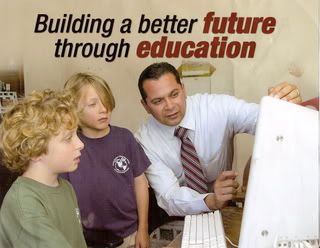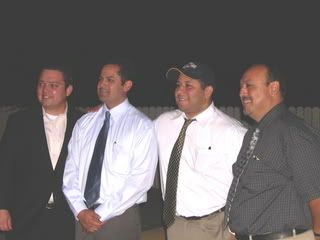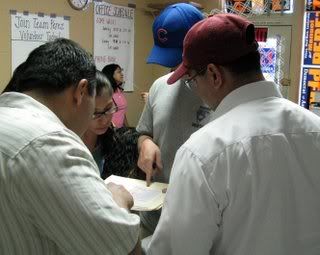I wrote last week about the failure of President Bush's economic stimulus package to stimulate anything beyond public opinion polls that prove its worthlessness and longer lines at food banks across California.
And with little of the stimulus package actually making it into the economy, states are still being forced to cut their FY2009 budgets to weather the slow economy.
The plight of states being forced to slash away at their budgets has been well chronicled this year, but on Sunday Louis Uchitelle wrote a piece in the New York Times about the broader implications of state cutbacks on spending. After highlighting the many crises caused by the economic failures of the Bush administration including a housing bust, credit crunch, shrinking level of consumption, rising unemployment and faltering business investment, they discuss one prop that’s holding up our failing economy:
State and city governments have yet to shrink the economy; indeed, they have even managed to prop it up. They have quietly maintained their spending at pre-crisis levels even as they warn of numerous cutbacks forced on them by declining tax revenues. The cutbacks, however, are written into budgets for a fiscal year that begins on July 1, a month away. In the meantime the states and cities, often drawing on rainy-day savings, have carried their share of the load for the national economy.
This article goes on to enumerate the kind of impact state budget cuts are really going to have on the economy:
At $1.8 trillion annually in a $14 trillion economy, the states and municipalities spend almost twice as much as the federal government, including the cost of the Iraq war. When librarians, lifeguards, teachers, transit workers, road repair crews and health care workers disappear, or airport and school construction is halted, the economy trembles.
In some states like California, the budget cuts and their negative consequences are already set in stone.
“We are looking at a $4 billion cut to public schools and deep cuts that will result in thousands of Californians losing their health care,” said Jean Ross, executive director of the California Budget Project, offering a preview of coming hardships. “But the reality is we have not pulled money off the streets yet.”
But when the current fiscal year ends in 30 days (or in the fall for many municipalities), state and city spending will fall, along with employment — slowly at first and then quite noticeably after the next president takes office.
The results of this slow down in spending could end up leaving little doubt as to whether or not the United States is in a full fledged recession:
Sometime next year, the decline will reach an annual rate of $50 billion, Goldman Sachs estimates. “It is a big reason to expect a weak economy in 2009,” said Jan Hatzius, chief domestic economist at the firm.
The $90 billion swing — from more spending to less — could be enough to push down a weak economy to zero growth or less, because state and city spending has accounted for as much as half of total economic growth since last fall.
Yet despite all of this there is a glimmer of hope if the federal government takes the proper course of action, which is hardly a given with the Bush administration. The answer is actually very simple:
…the next president, struggling to revive a weak economy, will almost certainly have to consider a second stimulus package.
But what should it be? Should it be a reprise of the checks, relying again on private-sector spending for rejuvenation? Or should Washington channel extra federal money to city and state governments so they can sustain their outlays for the numerous programs that otherwise would be shrunk? The answer, even on Wall Street, is often: subsidize the states and cities.
In creating the first economic stimulus package the government erred in assuming that the general public would spend most if not all of their rebate check and thus a significant portion of the stimulus package did not make its way back into the economy. In reality there is only one way to make sure that aid from the federal government gets spent. On giving money to the states:
“If you want to make sure that federal money gets spent, and jobs are created, you give it to them,” said Nigel Gault, chief domestic economist at Global Insight, a forecasting firm.
Like many others, Mr. Gault contends that more than 50 percent of the $107 billion in stimulus checks now going to households is likely to produce no stimulus at all. Instead, it will be used to pay down debt or buy imported goods and services. Imports bolster production in other countries; not in the United States.
Government has to step in, Keynesians argue, when private spending is not enough to lift the economy, despite the nudge from tax cuts or lower interest rates or rebate checks. This downturn might be one of those moments, involving as it does the bursting of a huge housing bubble. That has precipitated sharp declines in various tax revenues on which the states and cities depend, forcing them into extraordinary spending cuts.
The GOP propaganda machine would have you believe that the federal government stepping in with aid to the states would lead to nothing more than radical, out of control spending sprees on various projects that are not needed. Any rational person however would understand that this money would go towards ensuring states don't have to dramatically slash their budgets in a way that could wreck the economy, not starting new projects.
And for anyone who may be wondering which programs could use a little help, here is a great place to start.
Stateline.org wrote today about another potential crisis; unemployment benefits:
More than a dozen states would be hard-pressed to provide unemployment benefits if the economy tailspins into a full-blown recession and more workers get pink slips.
What happens if the unemployment trust funds run out of money? People will still get their benefits, it would just put an even heavier burden on the states:
If a state unemployment insurance trust fund runs out of money, unemployed workers would still get their benefits, but the state would have to borrow the money from the federal government and pay it back with interest. Such a scenario would burden those states that are already cash-strapped and borrowing heavily to balance their budgets without having to raise taxes.
This is not a small problem either, there are already four states in seriously trouble, and 14 more that could join them:
Michigan, Missouri, New York and Ohio could face the biggest problems since the amount of money in their unemployment insurance reserves already are far below recommended levels…
States that are also well below the recommended level with only about six months of money in their reserves are: Arkansas, California, Illinois, Indiana, Kentucky, Minnesota, North Carolina, New Jersey, Pennsylvania, South Dakota, South Carolina, Tennessee, Texas and Wisconsin.
Suggesting that the federal government do something to help the states with potential unemployment benefit crises is not outlandish. The program is already a joint federal-state program with joint funding by federal and state employer payroll taxes and the states administering the program. This also wouldn't be the first time that the federal government has stepped in to help the program. It was done in 2002 with considerable success
Most states’ UI trust funds weathered the 2001 recession, first because they went into the recession with more reserves than they have now. But Congress also helped in 2002 by transferring $8 billion from the federal UI trust fund to the individual state UI accounts.
If states are more strapped for funds now than they were in 2001, then it would seem that federal aid would be even more necessary today than it was 6 years ago. Especially if you factor in the slower economic growth rate and the number of people who are considered "long-term unemployed." Naturally this fact is lost on the Bush Administration. In today's episode of "inexplicable Bush administration economic policies that are destroying the country as we know it:"
Congress is once again considering helping states cover UI claims, but the measure has drawn a veto threat from President Bush, who has said such a move is too costly and premature.
Really? A move that would prevent the states from having to borrow money from the federal government at astronomical levels to balance the budget is too premature? The federal government can bail out Bear Stearns for $30 billion, but it can't provide states with the money they need to maintain unemployment benefits? Fortunately Congress doesn't have the same failed conservative talking points blinders on as the Bush Administration:
Before recessing for the Memorial Day holiday, the U.S. Senate passed, by a veto-proof margin, a measure that would extend unemployment benefits by 13 weeks for all workers and provide an additional 13 weeks for workers in high unemployment states. Unlike traditional UI benefits that are financed through federal and state payroll taxes, the federal government would pay for all of the extended UI benefits, estimated to cost $11 billion.
Thankfully there are some out there who understand the true role of the federal government is to step in when the states need it to the most, and right now state and local governments are cash strapped and desperately trying to avoid slashing essential services and programs out of their budgets. Let's hope more bills like this become the prevailing wisdom on Capitol Hill.









